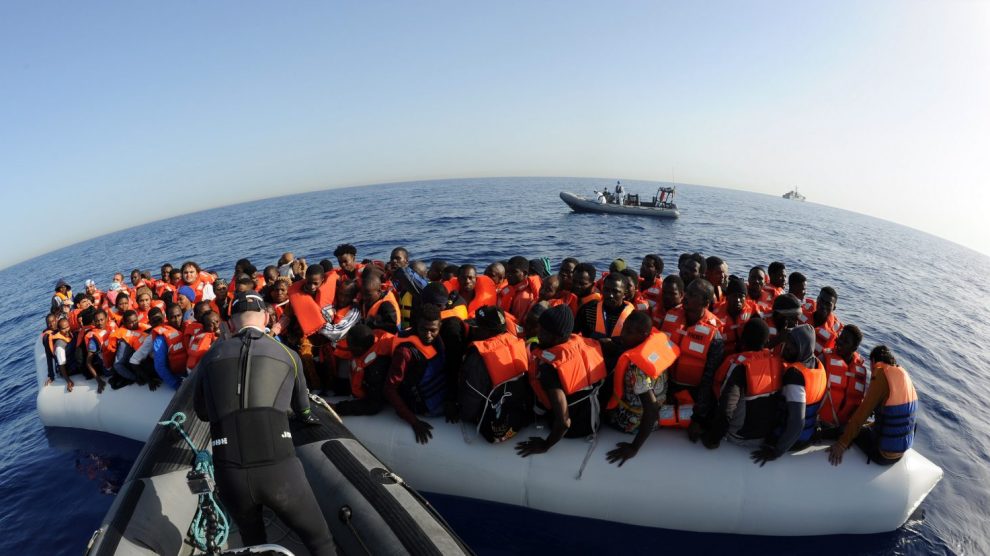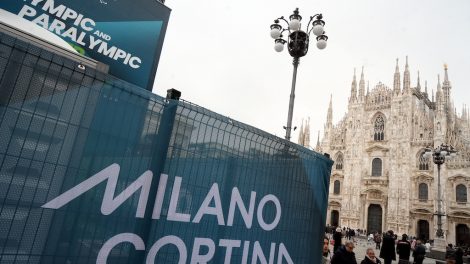Italy’s centre-right parties tackle migration (again). The recurring matter is being discussed by the coalition allies that comfortably lead the polls as Italy heads towards elections on September 25.
- Given their likely victory, migration control is sure to become a priority in the next government’s agenda. And the way they approach it could result in a clash between Italy and the rest of the EU, where border and humanitarian policies overlap.
The programme… In the government plan presented by the centre-right coalition – which includes Matteo Salvini’s League, Giorgia Meloni’s Brothers of Italy, Silvio Berlusconi’s Forza Italia and Lorenzo Cesa’s Noi Moderati –, migration is not addressed in great detail.
- The document speaks generically of a “new pact for migration and asylum, with border control and a blockade of landings to stop human trafficking, in agreement with North African authorities.”
… and the internal differences. The lack of further clarity makes sense when considering that party leaders, especially Ms Meloni and Mr Salvini, have expressed contrasting views on how to go about the issue.
Matteo Salvini was Interior Minister from 2018 to 2019. Back then, he made the fight against immigration and “border defence” his flagship policy. According to him, migration fluxes can be controlled by reintroducing the security decrees that bore his name and were cancelled in 2020.
- His solutions include abolishing the residence permit for humanitarian reasons and granting the Interior Minister the power to “limit or prohibit the entry, transit or stopover” of ships in national waters – including, as it happened, NGOs carrying rescued migrants, much to the dismay of other Europeans.
- He believes such measures have driven down landings, although several experts argue that was due to the agreements signed between the Italian government and Libya.
Giorgia Meloni, the rising star of the Italian right, recently proposed a naval blockade as “the only way to stop illegal immigration. We need a European mission in agreement with the North African authorities” to “put an end to illegal departures to Italy and the tragedy of deaths at sea,” she wrote on Facebook.
- Former magistrate Carlo Nordio, an MP candidate with BoI, noted that Ms Meloni used “naval blockade” as “a political expression” and that actually recurring to military vessels is “clearly unworkable.” The only solution, he stressed, is to make “agreements with countries of departure” such as those struck with Libya under former Interior Minister Marco Minniti.
- “We have seen it’s impossible to close off the seaports,” said Giovanbattista Fazzolari, a BoI senator close to Ms Meloni, adding that the “naval blockade” expression is a “semantic shortcut.”
Naval missions. Mr Fazzolari also posited that BoI wants to hinge its strategy on the Sofia mission, which was the EU Naval Forces’ attempt in 2015 to neutralise the migrant routes by tracking and destroying suspected human trafficking ships.
- That mission ended in 2020 and was replaced by Irini, which is set to continue until March 2023 at least. Current efforts include enforcing the UN-mandated arms embargo on Libya and training Libya’s Coast Guard and Navy.
The down-low: a centre-right government could negotiate with the other EU countries on the naval missions – so as to revert to a Sofia-style mission – and on solidarity efforts – seeing that the current framework, based on the 2019 Malta Agreement, works on a voluntary basis and is thus inefficient in redistributing migrants beyond first-access countries.
- Only the future can tell if such a government can successfully engage and uphold the needs of Italy (and other first-access countries) in Europe or end up dealing with the migration issue with ineffective tactics straight out of a populist’s playbook.





